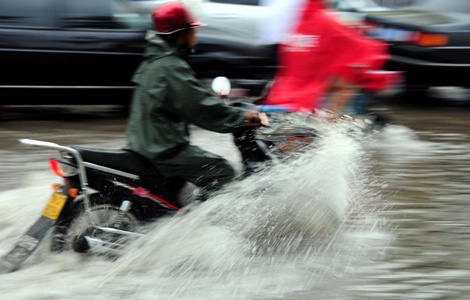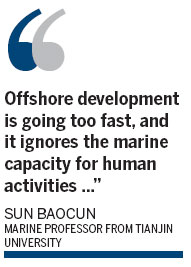Experts warn of fragile sea environment
Updated: 2011-08-12 07:55
By Wang Qian (China Daily)
|
|||||||||||
BEIJING - Following the continuing oil leak in Bohai Bay, experts warned that fast offshore development is polluting China's fragile sea.
With marine economy becoming another engine for the country's economy in the 12th Five-Year Plan (2011-2015), coastal provinces and municipalities are going full speed in their offshore development plans.
"Offshore development is going too fast, and it ignores the marine capacity for human activities, especially land reclamation from the sea and offshore oil and gas exploration," Sun Baocun, marine professor from Tianjin University, told China Daily on Thursday.
According to the general plan for land reclamation from the sea of the State Oceanic Administration in 2011, the permitted area in Liaoning is about 3,000 hectares while the planned area of the province's six coastal cities reached 100,000 hectares.
Most coastlines in China are not natural, but man-made, Sun sighed, citing as reasons the shrinking land resources and the cheap cost of land reclamation from the sea, about 450,000 yuan ($6,900) to 4.5 million yuan per hectare.
Statistics from the State Oceanic Administration showed in 2010 about 13,454 hectares of water was filled by sand to form land across China, China Economy Net reported.
As industry shifts from land to coastal areas and the sea, industrial pollution is threatening the seawater.
|
|
The recent oil leak in the Bohai Bay affected about 3,240 sq km at its peak, according to the statistics from the State Oceanic Administration.
Last year, a pipeline explosion in the northeastern port of Dalian caused oil to pour into the sea, spreading over at least 165 square miles (430 square kilometers).
"The oil and gas exploration industry is moving to deeper and broader waters offshore to meet the increasing energy demand," Sun said, adding that offshore supervision capability cannot keep pace with the rapid offshore development.
If "blind" development and exploration continue offshore, areas like the Bohai Sea will become dead seas with no living creatures, said Xu Hao, director of the Resources and Environment Science Department of the Agricultural University of Hebei.
Fang Jianmeng, director of the North China Sea Branch of the State Oceanic Administration, said at the International Ocean Forum in Xiamen last year that human development has caused a large-scale decrease of coastal wetland.
Li Ganjie, deputy minister of environmental protection, said in a news conference in June that coastal waters are slightly polluted, while water quality in the Bohai Sea is bad.
But the worsening marine environment doesn't stop the pace in exploring resources in the ocean, while the China National Offshore Oil Corporation, the biggest offshore oil and gas producer in China, has launched an advanced oil and gas drilling platform in June, enabling the drilling of oil and gas in waters up to 3,000 meters deep.
During the 11th Five-Year Plan (2006-2010), the country's marine economy increased by 13.5 percent, contributing to less than 10 percent of the national GDP.
Related Stories
ConocoPhillips blasted for slow oil spill clean-up 2011-08-02 10:37
ConocoPhillips says oilfield leak 1,500 barrels 2011-07-14 17:20
ConocoPhillips urged to apologize for slow action 2011-08-11 07:01
Hot Topics
Anti-Gay, Giant Panda, Subway, High Speed Train, Coal Mine, High Temperature, Rainstorm, Sino-US, Oil Spill, Zhu Min
Editor's Picks

|

|

|

|

|

|








